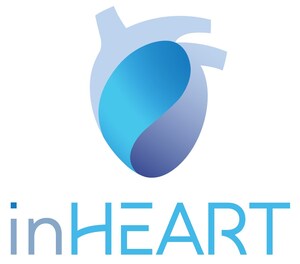inHEART RECEIVES CE CERTIFICATION UNDER NEW MDR FOR NOVEL, AI-BASED, DIGITAL TWIN OF THE HEART
inHEART solution creates digital 3D models of the heart with unprecedented anatomical details, allowing physicians to better plan and personalize cardiac ablation procedures
CAMBRIDGE, Mass. and PESSAC, France, May 18, 2023 /PRNewswire/ -- inHEART, a privately-held medical device company delivering the world's most advanced digital twin of the patient's heart, announced today that it has received CE certification under the new European Medical Device Regulation (MDR 2017/745) for its inHEART MODELS software suite that enables 3D visualization and analysis of anatomical structures for image-guided cardiac ablations. With this certification, inHEART will deliver fully automated segmentation of medical images with a new software module based on machine-learning technology to European customers. In addition, this certification will facilitate a swift pace of ongoing software enhancements.
Additional features of the inHEART solution already available in the US and now available in Europe with the new CE Mark MDR certification include new information (scar transmurality and left atrium wall thickness), new visualization and measurement tools, and an enhanced user experience.
"inHEART remains committed to delivering solutions that meet or exceed the highest quality and regulatory standards," said Todor Jeliaskov, President and CEO of inHEART. "With this CE Mark MDR certification, we demonstrate our commitment to provide physicians with 3D cardiac models they can trust to help them determine the optimal treatment plan for each unique patient. I am proud of the inHEART team and their commitment to this level of excellence."
The inHEART solution aims to address many of the challenges of conventional cardiac ablations with its proprietary segmentation algorithm that analyzes preprocedural CT and/or MR images to create highly detailed, interactive 3D models of the heart. This information allows physicians to optimize treatment strategies for cardiac ablation procedures based on each patient's unique cardiac anatomy and supports pre-procedural planning and seamless integration into all major electroanatomic mapping (EAM) systems.
Early clinical evaluations have shown a potential to reduce VT procedure times by 60% as compared to the conventional approach (from 5 hours to less than 2 hours). Shorter procedures are typically associated with superior safety and patient experience. In addition, these evaluations have demonstrated the potential for image-guided ablations to reduce failure rate by 38%, as compared to the conventional approach.1
About inHEART
inHEART is committed to delivering the world's most advanced, AI-enabled, digital twin of the heart to advance the care of patients living with cardiac disease. We believe all patients deserve access to world-class expertise that guides and optimizes treatment strategies to support improved clinical outcomes and return patients to full, healthy lives. For more information, visit inheartmedical.com
About European Medical Device Regulation (MDR)
The MDR 2017/745 came into effect in May 2021, replacing the former European Directives for medical devices (AIMDD 90/385/EEC and MDD 93/42/EEC). It is intended to establish a robust, transparent, predictable and sustainable regulatory framework for medical devices to ensure a high level of safety and health whilst supporting innovation. MDR has significantly increased the requirements in respect of technical documentation, benefit-risk evaluation, Unique Device Identification (UDI), Economic Operators, clinical data and post-market surveillance, with more stringent scrutiny of Competent Authorities and Notified Bodies. It represents the biggest change in European medical device compliance standards in more than 20 years.
1 Data on file
Logo - https://mma.prnewswire.com/media/1806866/4041943/inHEART.jpg






Share this article